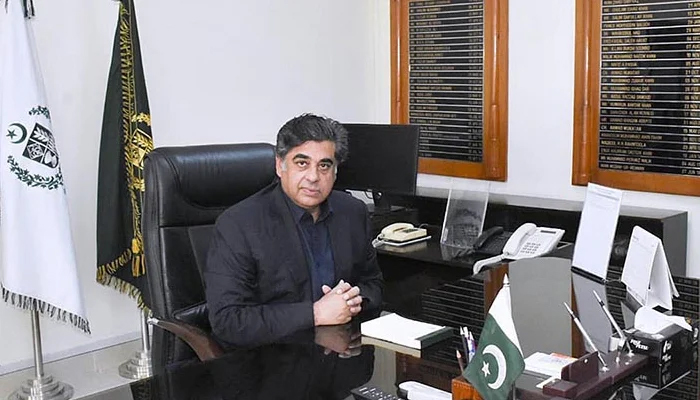Pakistan asks UAE to roll over $3 billion debt: minister
Ejaz sounded emotional while talking about difficult phase country is passing through
KARACHI: Pakistan has asked the United Arab Emirates (UAE) to rollover its $3 billion debt, as the South Asian nation faces a severe economic crisis, its caretaker commerce and industries minister said on Saturday.
Gohar Ejaz, who is also a prominent businessman, said he made the request during a recent visit to the UAE for a trade accord, where he was told that Pakistanis had invested $10 billion in the Gulf state’s real estate sector.
“UAE authorities informed me that Pakistanis had invested $ 10 billion in the real estate when I requested the rollover during the visit of UAE for the trade accord recently," Ejaz told a gathering of businessmen at the Federation of Pakistan Chambers of Commerce and Industry (FPCCI) in Karachi.
Ejaz sounded emotional while talking about the difficult phase the country is passing through. “We should think over it and why we have reached on the verge of collapse.”
He blamed the “foul play” in the Afghan Transit Trade (ATT) and under-invoicing in the imports from China for the sharp depreciation of the rupee, which has lost more than 28 percent of its value against the U.S. dollar in 2023.
He said he had brought data from China showing that $22 billion worth of imports from China were declared as $12 billion through under-invoicing, resulting in a huge loss of revenue for the government. "The foul play in ATT pushed the dollar up to Rs320 from Rs160," the minister said.
“You save the duty and taxes by importing through ATT, but you didn’t think that your wealth, earned in decades, halved by dollar appreciation... all of us need to brainstorm why the conditions have deteriorated so much that now we have to pay Rs9.5 trillion in debt servicing while the total national revenue collection is Rs9.5 trillion."
Ejaz called upon the business community to come out of under invoicing and subsidies by focusing on research through its platform FPCCI to give the input, based on research and knowledge.
The minister shared his deep concerns over the state of the country's economy; specifically, the trade deficit; rupee depreciation; low number of active tax filers; anomalies in the Afghan Transit trade; reliance on the external sources of financing and the dearth of the active participation of the business community in the policymaking.
Taking China as a role model, Minister Ejaz, highlighted that China, which is Pakistan’s largest trading partner and a major investor, has foreign exchange reserves in the upwards of $3 trillion – which has shown a growth of 600 times over the course of the last 30 years; while Pakistan has hardly managed to double its reserves to $9 billion from $4.5 billion during the tenure of the current caretaker government.
Ejaz invited the industrialists in Karachi to work for themselves and the country and said that the government would develop 10,000 acres of new industrial zone in the city, in which industries from China would be relocated. “We will create two million jobs in Karachi through these industries from China," he added.
"At the same time, the business community can simply triple its earnings; if they play their due role in the accomplishment of targets set by the economic team of the government. It is a win-win."
The minister told the industrialists that the Special Investment Facilitation Council (SIFC) also agreed that domestic consumers of power can’t be subsidized on the cost of industry, which comes to the tune of Rs.240 billion and assured that this issue would be resolved soon.
-
 James Van Der Beek's Quiet Sacrifice Before Death Comes To Light
James Van Der Beek's Quiet Sacrifice Before Death Comes To Light -
 Suspect Kills Six Across Florida Before Taking His Own Life
Suspect Kills Six Across Florida Before Taking His Own Life -
 AI Helps Researchers Identify 2,000-year-old Roman Board Game Stone
AI Helps Researchers Identify 2,000-year-old Roman Board Game Stone -
 Inside Kate Middleton, Prince William’s Nightmare Facing Andrew Mountbatten-Windsor
Inside Kate Middleton, Prince William’s Nightmare Facing Andrew Mountbatten-Windsor -
 Margaret Qualley Shares Heartfelt Confession About Husband Jack Antonoff: 'My Person'
Margaret Qualley Shares Heartfelt Confession About Husband Jack Antonoff: 'My Person' -
 Savannah Guthrie Shares Sweet Childhood Video With Missing Mom Nancy: Watch
Savannah Guthrie Shares Sweet Childhood Video With Missing Mom Nancy: Watch -
 Over $1.5 Million Raised To Support Van Der Beek's Family
Over $1.5 Million Raised To Support Van Der Beek's Family -
 Paul Anthony Kelly Opens Up On 'nervousness' Of Playing JFK Jr.
Paul Anthony Kelly Opens Up On 'nervousness' Of Playing JFK Jr. -
 Diana Once Used Salad Dressing As A Weapon Against Charles: Inside Their Fight From A Staffers Eyes
Diana Once Used Salad Dressing As A Weapon Against Charles: Inside Their Fight From A Staffers Eyes -
 Video Of Brad Pitt, Tom Cruise 'fighting' Over Epstein Shocks Hollywood Fans
Video Of Brad Pitt, Tom Cruise 'fighting' Over Epstein Shocks Hollywood Fans -
 Jelly Roll's Wife Bunnie Xo Talks About His Huge Weight Loss
Jelly Roll's Wife Bunnie Xo Talks About His Huge Weight Loss -
 Margot Robbie Reveals Why She Clicked So Fast With Jacob Elordi
Margot Robbie Reveals Why She Clicked So Fast With Jacob Elordi -
 Piers Morgan Praised By Ukrainian President Over 'principled Stance' On Winter Olympics Controversy
Piers Morgan Praised By Ukrainian President Over 'principled Stance' On Winter Olympics Controversy -
 Halsey's Fiance Avan Jogia Shares Rare Update On Wedding Planning
Halsey's Fiance Avan Jogia Shares Rare Update On Wedding Planning -
 Instagram Head Adam Mosseri Says Users Cannot Be Clinically Addicted To App
Instagram Head Adam Mosseri Says Users Cannot Be Clinically Addicted To App -
 James Van Der Beek Was Working On THIS Secret Project Before Death
James Van Der Beek Was Working On THIS Secret Project Before Death




